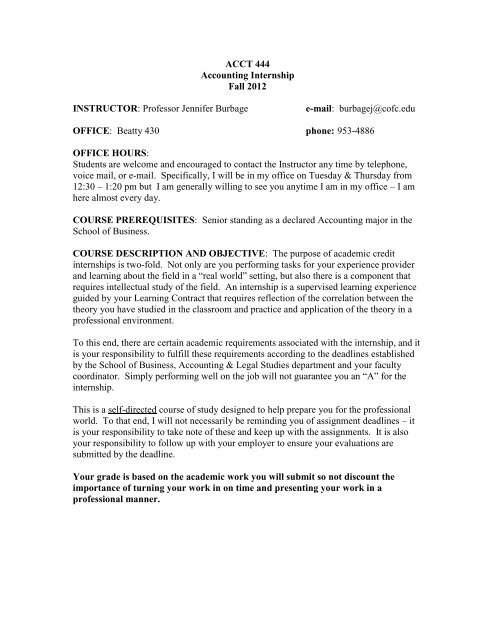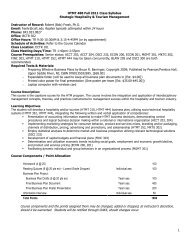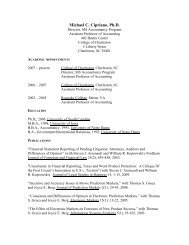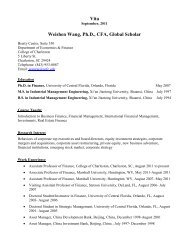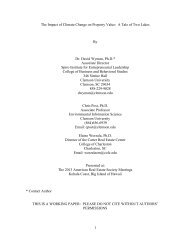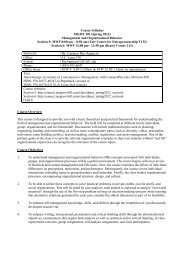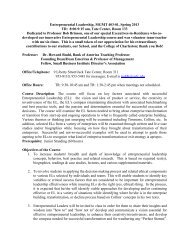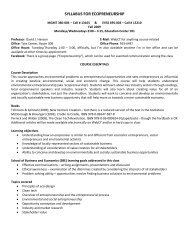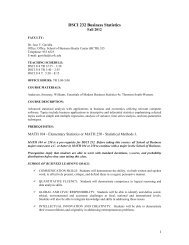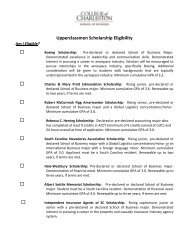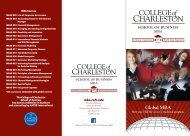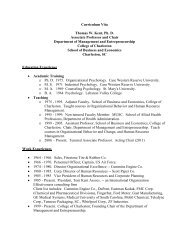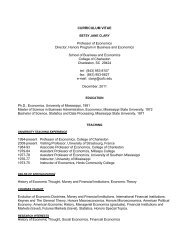Burbage, Jennifer - School of Business
Burbage, Jennifer - School of Business
Burbage, Jennifer - School of Business
You also want an ePaper? Increase the reach of your titles
YUMPU automatically turns print PDFs into web optimized ePapers that Google loves.
ACCT 444<br />
Accounting Internship<br />
Fall 2012<br />
INSTRUCTOR: Pr<strong>of</strong>essor <strong>Jennifer</strong> <strong>Burbage</strong> e-mail: burbagej@c<strong>of</strong>c.edu<br />
OFFICE: Beatty 430 phone: 953-4886<br />
OFFICE HOURS:<br />
Students are welcome and encouraged to contact the Instructor any time by telephone,<br />
voice mail, or e-mail. Specifically, I will be in my <strong>of</strong>fice on Tuesday & Thursday from<br />
12:30 – 1:20 pm but I am generally willing to see you anytime I am in my <strong>of</strong>fice – I am<br />
here almost every day.<br />
COURSE PREREQUISITES: Senior standing as a declared Accounting major in the<br />
<strong>School</strong> <strong>of</strong> <strong>Business</strong>.<br />
COURSE DESCRIPTION AND OBJECTIVE: The purpose <strong>of</strong> academic credit<br />
internships is two-fold. Not only are you performing tasks for your experience provider<br />
and learning about the field in a “real world” setting, but also there is a component that<br />
requires intellectual study <strong>of</strong> the field. An internship is a supervised learning experience<br />
guided by your Learning Contract that requires reflection <strong>of</strong> the correlation between the<br />
theory you have studied in the classroom and practice and application <strong>of</strong> the theory in a<br />
pr<strong>of</strong>essional environment.<br />
To this end, there are certain academic requirements associated with the internship, and it<br />
is your responsibility to fulfill these requirements according to the deadlines established<br />
by the <strong>School</strong> <strong>of</strong> <strong>Business</strong>, Accounting & Legal Studies department and your faculty<br />
coordinator. Simply performing well on the job will not guarantee you an “A” for the<br />
internship.<br />
This is a self-directed course <strong>of</strong> study designed to help prepare you for the pr<strong>of</strong>essional<br />
world. To that end, I will not necessarily be reminding you <strong>of</strong> assignment deadlines – it<br />
is your responsibility to take note <strong>of</strong> these and keep up with the assignments. It is also<br />
your responsibility to follow up with your employer to ensure your evaluations are<br />
submitted by the deadline.<br />
Your grade is based on the academic work you will submit so not discount the<br />
importance <strong>of</strong> turning your work in on time and presenting your work in a<br />
pr<strong>of</strong>essional manner.
Through the successful completion <strong>of</strong> this internship, the student will address the following<br />
<strong>School</strong> <strong>of</strong> <strong>Business</strong> Learning Goals:<br />
COMMUNICATION SKILLS: Students will demonstrate the ability, via both written and<br />
spoken word, to effectively present, critique, and defend ideas in a cogent, persuasive<br />
manner.<br />
QUANTITATIVE FLUENCY: Students will demonstrate competency in logical<br />
reasoning and data analysis skills.<br />
GLOBAL AND CIVIC RESPONSIBILITY: Students will be able to identify and define<br />
social, ethical, environmental and economic challenges at local, national and international<br />
levels. Students will also be able to integrate knowledge and skills in addressing these<br />
issues.<br />
INTELLECTUAL INNOVATION AND CREATIVITY: Students will be able to<br />
demonstrate their resourcefulness and originality in addressing extemporaneous problems.<br />
SYNTHESIS: Students will demonstrate the ability to integrate knowledge from multiple<br />
disciplines incorporating learning from both classroom and non-classroom settings in the<br />
completion <strong>of</strong> complex and comprehensive tasks.<br />
Required Hours<br />
All accounting interns are required to adhere to the internship beginning and ending<br />
dates on their approved learning contract. A minimum <strong>of</strong> 120 hours <strong>of</strong> on-site work is<br />
required. Your final grade will be affected for early termination <strong>of</strong> your internship. Time<br />
spent on journal entries, etc. does not count towards the 120 hours. Ideally, you will<br />
spend a minimum <strong>of</strong> 12 weeks on-site (8 weeks during the summer) and work at least 10<br />
– 12 hours per week (15 hours in the summer) with your experience provider. You may<br />
not work 3 40-hour weeks. The purpose <strong>of</strong> spreading the internship out over a semester<br />
is to give you an idea <strong>of</strong> the work flow in the field. End-<strong>of</strong>-year tasks, for example, are<br />
<strong>of</strong>ten quite different from the work you will be doing at the beginning <strong>of</strong> the semester.
Completion <strong>of</strong> the following assignments is the basis for earning grade and college<br />
credit:<br />
1. Weekly journal: Students are required to keep a weekly journal identifying<br />
course concepts as applied in the workplace. The journal must be typed and<br />
double-spaced. It is submitted electronically by midnight on Mondays (beginning<br />
September 3 rd ) using the OAKS dropbox set up for the course. Late entries will<br />
receive a 5 point deduction. An entry submitted after Wednesday the week it<br />
is due will be given a “zero.” For a list <strong>of</strong> journal entries and their due dates,<br />
please refer to the Oaks dropbox (you will note there is no journal entry due the<br />
week after Thanksgiving).<br />
The format for the journals is as follows:<br />
Your name:<br />
Experience provider:<br />
Name <strong>of</strong> experience provider supervisor:<br />
Week <strong>of</strong>:<br />
Hours worked for the week:<br />
Hours worked to date:<br />
Weekly journal entry should include:<br />
What tasks you performed for the week with results, if any<br />
Workplace observations – any thoughts on how things could/should run<br />
differently or how situations could have been handled differently<br />
Workplace activity (what is going on in the <strong>of</strong>fice)<br />
Reactions to events taking place in the <strong>of</strong>fice<br />
How classroom concepts are applied in the work environment<br />
What you are learning from the experience<br />
Important note. Please submit your journals comprehensively with the most<br />
recent week’s entry as the first entry in the document, followed by the previous<br />
weeks’ submissions. By the end <strong>of</strong> the semester, you should have one<br />
comprehensive journal entry document with all your entries included. Please see<br />
the sample at the end <strong>of</strong> this syllabus as an example.
2. Special project and report: The host employer and Instructor will coordinate to<br />
select a relevant special project for assignment and completion by the student<br />
intern. Concurrent with completion <strong>of</strong> the special project, the intern will prepare<br />
an executive-level business report appropriate for submission to top management.<br />
In general, most accounting interns will select a topic and write a research paper<br />
on this topic, tying it to relevant internship work experiences. The topic will<br />
begin to become apparent as your work and as you submit journals. I will help<br />
you to develop a topic in order to ensure it is broad enough to cover 10 pages, but<br />
is not so broad that it cannot adequately be addressed.<br />
The report must have a minimum <strong>of</strong> 10 pages, double-spaced, not including<br />
appendices or reference pages. You should use a minimum <strong>of</strong> three valid<br />
references and cite each reference used. It is submitted to the Instructor via the<br />
Oaks dropbox and is due no later than Monday December 3, 2012.<br />
3. Executive interview summary (1 required): Students will interview one seniorlevel<br />
manager to understand his/her career and discuss career development.<br />
Students will summarize the interview in a one (1)-page written document. It is<br />
submitted to the Instructor via the OAKS dropbox no later than Friday October<br />
26, 2012.<br />
Job Performance and Satisfactory Evaluations: The focus <strong>of</strong> the Accounting<br />
Internship course is to develop practical career-related experience. Performance<br />
evaluations are completed by the host employer during the Internship course and upon<br />
completion <strong>of</strong> the Internship course. At least two (2) performance evaluations are<br />
documented to form the basis for grade assignment and awarding <strong>of</strong> college credit. The<br />
evaluations will be sent directly to the Host Employer by the internship <strong>of</strong>fice and are due<br />
October 12 th and November 30 th .<br />
Grading and College Credit: The Accounting Internship Course requirements are<br />
weighted as follows for assignment <strong>of</strong> final grade and credit:<br />
Journals 50% Due every Monday beginning September 3 rd<br />
Special project and report 30% Due December 3 rd<br />
Executive interview summary 10% Due October 26 th<br />
Job performance and evaluations 10% Due October 12 th and November 30 th<br />
100%<br />
During the course, any problems having the potential to cause failure to achieve the<br />
objectives <strong>of</strong> the course must be reported to the Instructor as soon as practical. Failure to<br />
keep the Instructor informed <strong>of</strong> potential problems may result in reduced grade<br />
assignment or failure <strong>of</strong> the Accounting Internship course. Late assignment submissions<br />
are likely to result in a deduction <strong>of</strong> points.
GRADES: Course grades will be computed as follows:<br />
A 94 – 100 C+ 77 – 79 D- 60 – 63<br />
A- 90 – 93 C 74 – 76 F 0 – 59<br />
B+ 87 – 89 C- 70 – 73<br />
B 84 – 86 D+ 67 – 69<br />
B- 80 – 83 D 64 – 66<br />
HONOR CODE: The College Honor code will guide the behavior <strong>of</strong> each student.<br />
Lying, cheating, attempted cheating, and plagiarism are violations <strong>of</strong> our Honor Code<br />
that, when identified, are investigated. Each incident will be examined to determine the<br />
degree <strong>of</strong> deception involved. Students can find the complete Honor Code and all related<br />
processes in the Student Handbook at<br />
http://www.c<strong>of</strong>c.edu/generaldocuments/handbook.pdf<br />
Special Note: Misrepresenting the work you are doing with your Experience<br />
Provider in journal entries, final papers, etc. may result in failure <strong>of</strong> the course.<br />
Pr<strong>of</strong>essional Attire<br />
As a representative <strong>of</strong> the college and <strong>of</strong> your experience provider, you are expected to<br />
dress appropriately for the work environment.<br />
For men, this means khakis, a shirt with a collar and a tie. Sports coats are optional.<br />
For ladies, nice pants or skirts <strong>of</strong> a conservative length (slightly above the knee is okay,<br />
mini-skirts are not), a nice blouse, sweater or top (as long as it’s not too tight) will be<br />
fine.<br />
It is never okay in the <strong>of</strong>fice to wear t-shirts, flip-flops, outfits that show your midriff,<br />
blue jeans (unless the <strong>of</strong>fice has a dress-down day), cut-<strong>of</strong>fs, tennis shoes nor baseball<br />
hats.<br />
Obviously if your place <strong>of</strong> work has a uniform or requires a certain dress (you are<br />
interning with the Riverdogs, for example) you will follow their guidelines for attire.<br />
Do not wear nose rings (nor other visible piercings) in the workplace.
Pr<strong>of</strong>essional Conduct<br />
You would be amazed at how quickly doors close to those who “don’t know how to do.”<br />
Here are some guidelines to help you navigate etiquette pitfalls:<br />
No cell phones. You have been given the opportunity to learn, so use the time<br />
wisely. You can catch up with your roommate after hours.<br />
No texting – even if it’s quick.<br />
No checking Facebook, Myspace, etc. You can do this when you are <strong>of</strong>f the<br />
clock.<br />
Saying please and thank you goes a long way with people.<br />
When the boss asks you if you want to grab a bite to eat – go! What a great<br />
opportunity to talk one on one with someone who is in the business and would be<br />
flattered to tell you how he/she got where they are today. Saying “no” – for<br />
whatever reason sends a signal that you are uninterested.<br />
Don’t interrupt.<br />
Exercise voice volume control, particularly in open cubicle spaces.<br />
Embrace grunt work. While you are not there to solely make copies nor run out<br />
to pick up lunch, we all have a certain amount <strong>of</strong> administrative tasks that we<br />
have to do.<br />
Make eye contact always.<br />
Avoid getting “attitudinal.”<br />
When meeting someone, don’t forget to introduce yourself – first and last name.<br />
Show initiative. When you have completed a project, ask for another. If you see<br />
something that needs to be done, ask your host if you can take on the task.<br />
Write pr<strong>of</strong>essionally. Don’t send emails written as if you were texting.<br />
Watch your tone in emails to avoid sending snippy or curt emails.<br />
Manners matter. Don’t talk with food in your mouth, etc.<br />
Own up to mistakes and accept responsibility.<br />
Emails are addressed in order <strong>of</strong> hierarchy within the company with the most<br />
senior staffer first. For example, president, vice-president, manager, etc.<br />
Alphabetizing the distribution list is acceptable as well.<br />
“Issues”<br />
It rarely happens, but sometimes there are “issues” associated with internships. This<br />
could range from experience providers using the intern as a “go-fer” versus providing a<br />
good learning experience to personality conflicts or sexual harassment. If at any time<br />
you have an issue with the internship, contact your faculty supervisor as soon as possible.
Weekly journal entries sample<br />
Name: Bob Jones<br />
Experience Provider: Bulldog Express<br />
Company Supervisor: Tim Wilson<br />
Week Of: December 1<br />
Hours worked for the week: 12<br />
Hours worked to date: 120<br />
Over the course <strong>of</strong> the last week I watched my <strong>of</strong>fice responsibilities grow and was able<br />
to participate in several different projects. I feel as though this change in responsibilities<br />
comes as a result <strong>of</strong> my employers realizing I am capable <strong>of</strong> more complex tasks.<br />
This week I was assigned the task <strong>of</strong> designing two new questionnaires, one for<br />
individual clients and the second for businesses. These questionnaires were comprised<br />
<strong>of</strong> personal questions that ranged from favorite sports teams to children’s names, in an<br />
effort to make the clients relationship with their financial advisors more personable.<br />
Following this section were questions about their financial plans, expectations and goals.<br />
I had a basic template to work from but I found my marketing research class to come into<br />
great help in the design <strong>of</strong> the questionnaire. It helped me with determining the<br />
appropriate structure, the use <strong>of</strong> skip patterns, and just general flow. My supervisor was<br />
very impressed with my work so I would say that the class prepared me for tasks similar<br />
to this.<br />
Name: Bob Jones<br />
Experience Provider: Bulldog Express<br />
Company Supervisor: Tim Wilson<br />
Week Of: November 25<br />
Hours worked for the week: 11<br />
Hours worked to date: 108<br />
This week we worked on the marketing plan, identifying the target audience. The<br />
methodology was similar to what I learned in MKTG 302. In class, we spent a lot <strong>of</strong> time<br />
on identifying demographic data. At Bulldog Express, they rely more on psychographic<br />
data than on demographic data and gather the information through one-on one interviews.<br />
The target market pr<strong>of</strong>ile is men who make between 25 and 40,000 a year, attend three<br />
sporting events a month, vote Republican and have a bulldog named Guido. After we<br />
determined the target market pr<strong>of</strong>ile, I called area media outlets and asked for a media<br />
kit. I remembered from my advertising class that the media kits contain audience<br />
pr<strong>of</strong>iles. Next week, I will make a recommendation on what local media outlets will best<br />
reach the target market.
Name: Bob Jones<br />
Experience Provider: Bulldog Express<br />
Company Supervisor: Tim Wilson<br />
Week Of: November 18<br />
Hours worked for the week: 10<br />
Hours worked to date: 94<br />
This week I was given access to corporate revenues. I learned how to read a balance<br />
sheet in ACCT 203, and with some help from my supervisor in interpreting the data,<br />
noticed that the revenue for the men’s sportswear line had declined almost 27% from past<br />
quarter. I asked Tim about this, and he said he didn’t know why the men weren’t<br />
shopping with Bulldog any longer.<br />
He asked me to put together some recommendations on how to reach the male audience.<br />
In MKTG research, we learned about observational research methods. I spent the<br />
remainder <strong>of</strong> the week on the sales floor looking at the shopping habits <strong>of</strong> the male<br />
customer – how many male customers were in the store per hour, what section they spent<br />
the most time in, what sections they avoided, etc. I will compile my findings and present<br />
to Tim next week.<br />
Etc, etc, etc, back to week one.<br />
.


